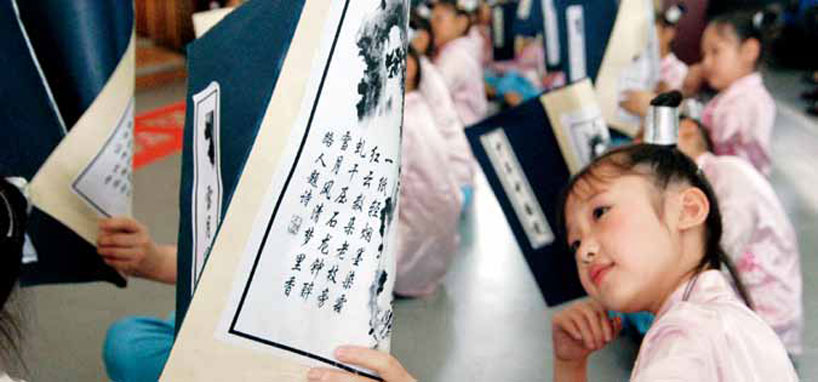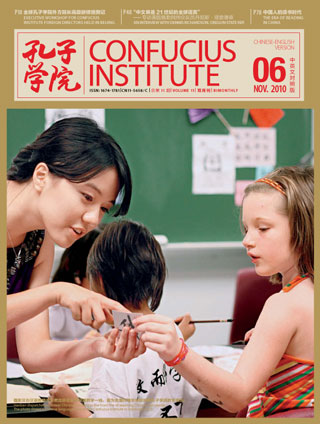
Reading in China: Enriching our minds
Reading in China is undergoing a deep transformation. Today people spend less time on reading newspapers, books and periodicals, but more time on online reading and mobile phone reading. Despite that, more than 270,000 varieties of books are published in China every year, ranking the first in the world.
Reading intellectual books enlighten the mind, for the spiritual development of people is determined by what they read, and the moral state of a nation depends on the reading tastes of its people. Confucius advocated the ideas of “reading not for the sake of making a living” and “A good scholar will make an official”. Mencius said that in ancient time “In obscurity, scholars would maintain their own integrity. In times of success, they would help the whole empire”. Prof. Yuan Yi of the China Society for Library Science explains the chinese reading tradition: By means of reading, people achieve cultivation and achieve the ideal of “making the whole nation virtuous”, pass on Confucianism, and bequeath the ethical culture of farming and reading to the family.
A debate about reading in China has lasted for three years. Some famous writers like Wang Anyi, Zhang Kangkang and Liang Xiaosheng, on the one side, propose that one official reading day should be set up to call on the nation to read books and suggest Confucius’ birthday, September 28, as National Reading Day. However, famous scholar Yu Qiuyu unexpectedly holds the opposite opinion: in the age of the internet information explosion, reading in China is insufficient and even a “disaster”. His opinion has made himself a target of public criticism.
As a matter of fact, Yu Qiuyu, as a famous scholar who has read many books, is not really opposed to reading books. By addressing the issue in strong words, as he usually does, he just wants to voice his concern about “shallow reading” and “spiritual rubbish”; he thinks we should select carefully what we read and not just read everything available. Actually this is what many people are worried about — whether the traditional way of reading faces a crisis in modern life.
The traditions of reading and self-cultivation
It is an early morning in a Beijing suburb, magpies fly about as some children read aloud. “The swallows fly about, with their wings unevenly displayed. The lady was returning to her native state, and I escorted her far into the country. I looked till I could no longer see her and my tears fell like rain.” is is what we see and hear in Shengtao School established by Shu Yi, the son of the famous writer Lao She. This school is a modern “old-style private school” offering children traditional cultural education.
Chinese people’s traditional reading habits can be traced back thousands of years and have been greatly influenced by the representative of Chinese civilization Confucius and the culture deriving from his theories — the doctrines of Confucius and Mencius — Confucianism.
Confucius advocated the ideas of “reading not for the sake of making a living” and “A good scholar will make an official”. Mencius said that in ancient time “In obscurity, scholars would maintain their own integrity. In times of success, they would help the whole empire”. Prof. Yuan Yi of the China Society for Library Science explains the Chinese reading tradition: By means of reading, people achieve cultivation and achieve the ideal of “making the whole nation virtuous”, pass on Confucianism, and bequeath the ethical culture of farming and reading to the family.
Even today, plaques with four words “耕(gēng) 读(dú) 传(chuán) 家(jiā) (farming and reading to be queath to the family)” are still often seen hung in many old buildings. In old times, a family made a living by farming. After working on the land, members of the family read (四(sì) 书(shū)) the FourBooks, (三(sān) 字(zì) 经(jīng)) Three-character Scripture , (百(bǎi) 家(jiā) 姓(xìng)) the Pamphlet of Chinese Surnames, (千(qiān)字(zì)文(wén)) the One Thousand Characters Primer, or listened to the older people tell- ing historical stories. People had Confucian morality education in their daily life. As for those people who wanted to become scholars and fulfill their ambitions by passing civil service examinations, they had to undergo many years of rigorous training, studying the complete works of Chinese classics, cultivating amoral character and nourishing nature. In the old bureaucratic evaluation system, whether an official was qualified or not depended on both his administrative achievements and whether he was well educated and cultivated.
People of old times were very serious about reading. Before they read, they performed the ritual of burning incense and washing hands. In this way, they showed their respect for reading and their forefathers. They believed that reading the books of the ancients was like having a talk with their forefathers and reading books of contemporaries was like having a conversation with wise people.
This Chinese reading tradition has been passed down to modern times. Chinese people thought that any paper which was written upon was sacred; there was a tradition of “cherishing paper bearing written or printed words”. In the famous literary work “Four Generations” by Lao She, there is such an old man:“he is in an old cotton robe which only covers his knees. In his hand is a big canvas sack on which four big black characters are written ‘敬(jìng) 惜(xī) 字(zì) 纸(zhì)’ (Cherish paper bearing written or printed words)”. This was the custom in old Beijing: any paper bearing written or printed words should not be made dirty; even waste paper should be picked up, collected, cleaned, dried and then burned in a censor, which is a way of worshipping heaven.

Worries about shallow reading in China
According to the 7th National Chinese Readers Survey Report, time used for reading every day by an average Chinese adult reader is divided thus: 34.09 minutes for online surfing, 21.02 minutes for reading newspapers, 15.40 minutes for reading magazines, 14.70 minutes for reading books, and 6.06 minutes for reading on the mobile phone. The survey shows that today people spend less time on reading newspapers, books and periodicals, but more time on online reading and mobile phone reading.
Browsing online is replacing the traditional way of reading. Now fast reading, scanning reading and fragmented reading have become new reading tendencies. People are reading more on electronic machines than in the traditional way.
Xiaozhong, a junior in college, told us that he and his fellow students read various fantasy and martial-arts novels and love stories downloaded from the Internet and spent almost all their spare time reading them. They all know these novels are of little value and read them just for relaxation and fun, for they don’t need to use their heads while reading them; whereas the literary classics are too thick and difficult to understand. The fact that college students prefer “shallow reading” so much bears out Yu Qiuyu’s worry about “spiritual rubbish”.

According to one survey, only one fifth of the population reads for the purpose of cultivating the moral character and nourishing nature, and all the other people read for some practical need. It is because of this practical atmosphere of publishing books that booksellers are driven by short-term profits so that many serious and good books are neglected.
But there are still some people who would rather hold on to classic works in which few people are interested than follow the trend. The editor of The Complete Works of Wang Guowei, 66-year-old Qiu Baoru, devoted 13 years to the set of books with all his heart, and finally got the 8.4 million-character classic masterpiece in 20 volumes published.
It is undeniable that the existence of shallow reading today has some utilitarian reasons. It is a good way to get quick information, broaden one’s range of knowledge, and get relaxation and fun, and it can be used as a means to gain some profit. But it cannot take the place of in-depth reading — reading intellectual books to enlighten the mind, for the spiritual development of people is determined by what they read, and the moral state of a nation depends on the reading tastes of its people.
You can always benefit from reading
Th ere is a bookstore in Shenzhen called “Starlight Bookstore”, which is the only 24-hour bookstore in the Mainland.
The bookstore is not big — an area of only 300 square meters. Books here only have serial numbers but are not classified. In doing so the bookstore wants to provide the readers a space in which they may wander around until they come upon a book they like. The salesclerks here do not show excessive attention to the readers either. For many customers, this bookstore is a part of their lives. Some habitually come in and stay for a while after finishing morning exercises; some come in with their shopping baskets, sometimes newly bought fish still flopping in the basket. Even on the eve of the Spring Festival, some readers come to the bookstore and stay up reading books to welcome the New Year. When the salesclerks get off work, they are not in a hurry to leave. They often sit down and read quietly for a while. The investor of the bookstore said that from the day the bookstore opened, he didn’t have any expectation that it could make money. What he wants is just to keep the bookstore in operation.
Many people are deeply impressed by Shenzhen people’s love for reading. Ten years ago, Shenzhen was still called “a cultural desert”. After it was transformed from a fishing village to the special economic region open to the world, it has become the successful example of Chinese economy. But with a lot of young migrants flooding into Shenzhen, the city was lacking in cultural identity and cultural atmosphere. In the recent ten years, however, Shenzhen is beginning to transform itself from a “cultural desert” to a “city of libraries”. In this city, if you don’t want to be left behind, you must continue studying. Reading has become a way of life in this city.
In 2000, the first Reading Month activity was held in Shenzhen. From then on various reading activities have been held in more than 400 cities across the country. People’s enthusiasm for reading is spreading widely.
Today, more than 270,000 varieties of books are published in China every year, ranking the first in the world. In recent years, 71 book buildings with an area of over ten thousand square meters have been built across the country, among them Beijing’s Xidan Book Building with the area of 150,000 square meters being the most famous one. Many foreigners are amazed by the large scale of these book buildings.
No matter whether weekend or week day, people swarm into the bookstores like Xidan Book Building, Xinhua Bookstore on Beijing’s Wang Fujing Street, and the Shanghai Book Building. Sometimes people stand in queues of 20 to 30 meters long at checkout counters waiting to pay for the books. In the National Library, every reading room is packed with readers on holidays. ose arriving a little late, find it difficult to find a seat, which is quite common in many other cities.
“Reading makes a man graceful.” “Without reading for three days a person may find himself loathsome in appearance and boring in words.” These two sayings reflect many Chinese people’s spiritual pursuit. Reading in China is a private thing, but it is actually closely related to public responsibilities — self-cultivation, regulating the family, governing the country and establishing peace throughout the world. Th is is the reading tradition passed on to the Chinese people.



























No hay comentarios:
Publicar un comentario